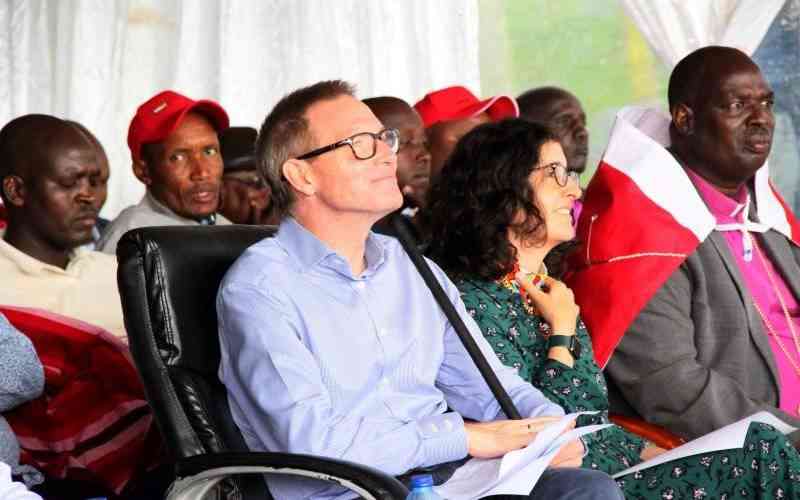By Kamotho Waiganjo
Recently I had a sobering conversation with an old couple whose children had all moved out of home, firstly to attend university and then to the city where they were engaged in various careers. Other than the traditional visit over Christmas, these children, who are otherwise materially very supportive of their parents, hardly visit home, what with the demands of their careers and their young families.
In a moment of unusual candidness, this old couple shared with me how they sometimes wished that one of their children had not done well in school so that his family would stay in the village and look after them in their old age. What this couple was expressing is a developing crisis, the curse of urbanisation on the aged.
For many rural families, the first assault on the “tranquility” of the family is education. Our education structure is such that the higher one goes, the further and further from the village they move. By the time a child goes to college, they have cut the umbilical cord with the village, quickly moving to the city where the post-college jobs are. For those not pulled by education, urbanisation is quickly sucking the young from the village. With minimal income generating activities in rural areas, poor infrastructure and growing insecurity, there is no escaping the pull of the city with its myriad offers of opportunities, better infrastructure and services.
For the aged and ageing these twin assaults on the rural areas is devastating. Without a rural economy, the level of destitution is slowly mutating to desperation. Added to this is absence of the most essential services for the ageing, particularly easy access to well resourced health services. At the micro level, the absence of traditional family and social support structures is what informed my candid aged couples’ odd wish for an “unsuccessful” child.
As a country we are not at crisis level yet. The majority of our population still live in the rural areas and the family support structures, though weak, are still wobbling along. But this situation will not be for long as the country quickly urbanises, a trend that is global and inescapable. Statistics show that currently, in the developed world more than 80 per cent of the population live in cities.
The developing world is not far behind, indeed 90 per cent of the urban growth is occurring in developing countries. It is estimated that whereas currently only about 30 per cent of Africans currently live in cities, in a short 15 years when our vision 2030 will be maturing, about 60 per cent of us will live in cities.
Because this transition to the cities will naturally favour the young, we must start to consider how to proactively look out for those that will be trapped in the rural areas by age. Many years ago, it used to be a mark of absolute social irresponsibility to even consider concepts like the “old people’s homes”. We were brought up to believe that we don’t abandon parents in institutions. I believe, however, that it is time we stopped living in denial and realise that for many of us, creating an environment where our aged parents live in a more friendly social environment with easy access to infrastructure and services is the kindest thing we will do to them. The reality is that they remain abandoned anyway, only this time in unfriendly villages. In an ideal world, as our parents age, they should come live with us, enjoying the comfort of our care. This idealistic world is as unreal as the one which expects our children to spend their holidays with grandma as we used to do.
In the West that we discredited due to its old peoples’ homes, the concept has so developed that the typical old people’s home is a friendly environment where the aged interact with their peers, have socially and economically invigorating activities, including aspects that enable them add value to society. Nothing stops us from fashioning similar institutions that still respond to the uniqueness of our social set ups.
Agreed, institutionalisation is not the only solution to our developing crisis, but solutions are urgently needed; we can only hide our heads in the sand for so long.
 The Standard Group Plc is a
multi-media organization with investments in media platforms spanning newspaper
print operations, television, radio broadcasting, digital and online services. The
Standard Group is recognized as a leading multi-media house in Kenya with a key
influence in matters of national and international interest.
The Standard Group Plc is a
multi-media organization with investments in media platforms spanning newspaper
print operations, television, radio broadcasting, digital and online services. The
Standard Group is recognized as a leading multi-media house in Kenya with a key
influence in matters of national and international interest.
 The Standard Group Plc is a
multi-media organization with investments in media platforms spanning newspaper
print operations, television, radio broadcasting, digital and online services. The
Standard Group is recognized as a leading multi-media house in Kenya with a key
influence in matters of national and international interest.
The Standard Group Plc is a
multi-media organization with investments in media platforms spanning newspaper
print operations, television, radio broadcasting, digital and online services. The
Standard Group is recognized as a leading multi-media house in Kenya with a key
influence in matters of national and international interest.








